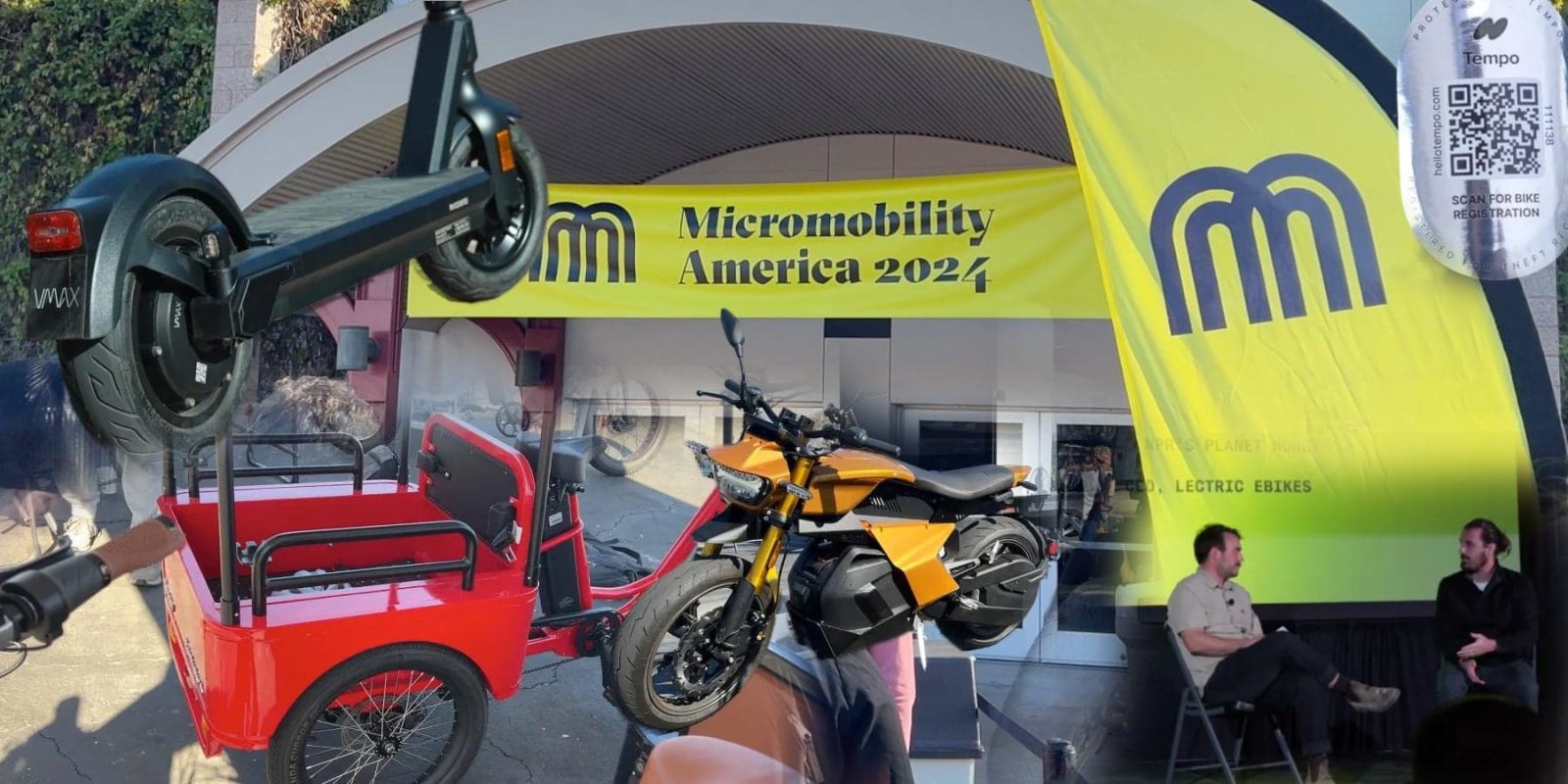
Each year the Micromobility America conference meets in California to showcase the latest companies and advancements in the light electric vehicle world. The sister show to Micromobility Europe, this year’s North American conference moved to Southern California, bringing to Costa Mesa an array of just about every type of micromobility device you could imagine, from e-bikes, e-scooters and fully-fledged electric motorcycles to four-wheeled neighborhood electric vehicles.
While it’s hard to cover every single company from the show, we did our best to pull out as many highlights as possible. See them below, or watch the video for an up close and personal experience. Or both!
Lectric Ebikes
Lectric Ebikes, which has grown in just five years to the best-selling electric bike brand in the US, had a prime spot at the show to share the company’s ever-growing lineup. At the center of the booth was the new Lectric XPedition 2.0 electric cargo bike, which was recently unveiled as a major update to the brand’s first cargo e-bike.
The XPedition somehow retained the same $1,399 selling price, while coming with lots of new features like an upgraded frame, improved suspension fork, torque sensor, better brakes, color display, larger battery options, and plenty of other new features.
The company’s CEO, Levi Conlow, was also one of the most popular speakers at the event, sharing his insights with the standing-room-only audience.
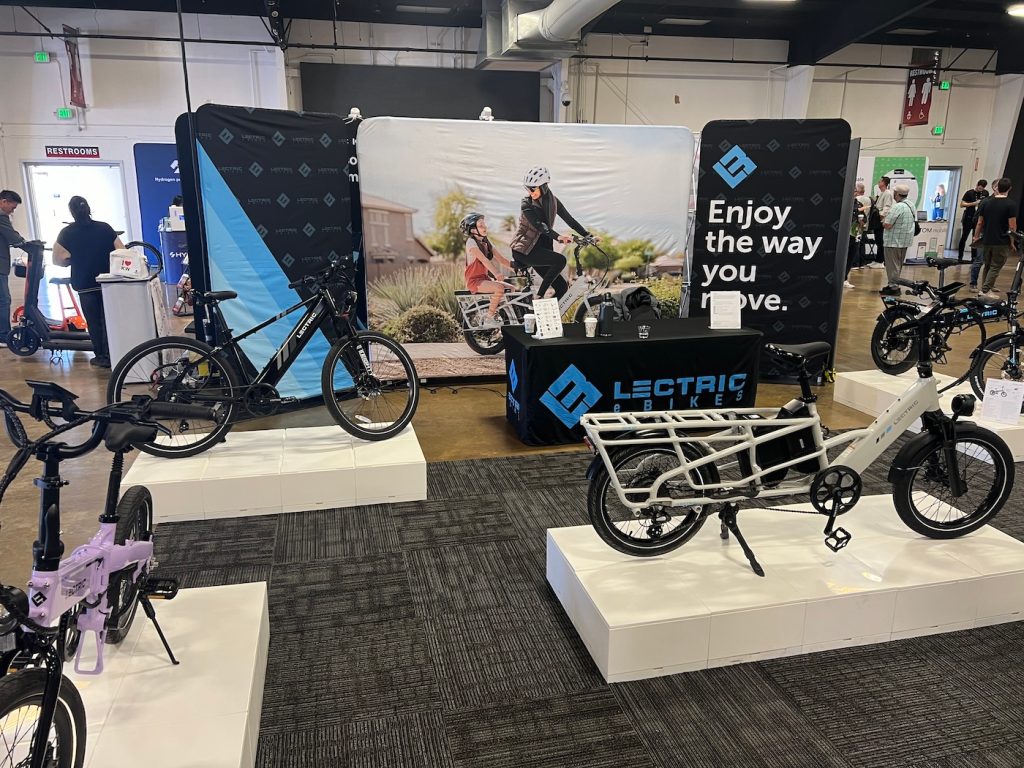
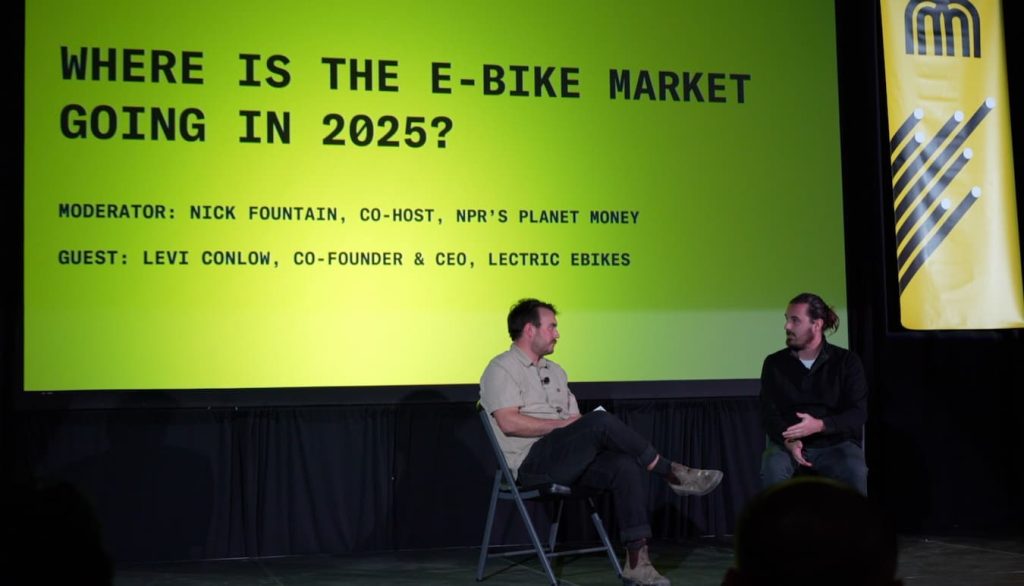
VMAX Electric Scooters
The Swiss-based electric scooter company VMAX was also on hand, leveraging their US expansion last year and their local LA-based distribution center.
The company brought nearly all of their models of electric scooters to the show and I had the chance to try several of them out.
The small and low-cost ($349!) VMAX VX5 and its upgraded VX5 Pro electric scooter are surprisingly peppy for a so-called “entry-level scooter”, and I could easily hit the 18 mph (30 km/h) top speed. There’s no suspension, but the scooter is so light that it doesn’t seem to miss it.
I spent more time on the VX2 Extreme (and I also borrowed one for the few days I was in LA – more on that experience soon) and can tell you that the upgraded power is potent. In its highest power mode, the 1,600W rear hub motor would easily wheelie and I had to remember to keep more weight on the front of the scooter while accelerating or just not go full-throttle, like I’m used to on weaker scooters where the throttle is basically an on/off switch. With the VX2 Extreme, you can treat the throttle more like an actual variable accelerator instead of just mashing it all the way to take off. That’s how much power this light and nimble scooter unleashes. Pretty impressive for $799!
The last model I tried was the VMAX VX4, which adds some comfortable suspension and more speed, though is a bit heavier. You give up some portability to get that extra performance, so this isn’t one you’d want to carry for too long (unless you’re ok with hauling 60+ lbs around by hand), but it’s incredibly planted and comfortable for longer cruising at higher speeds.
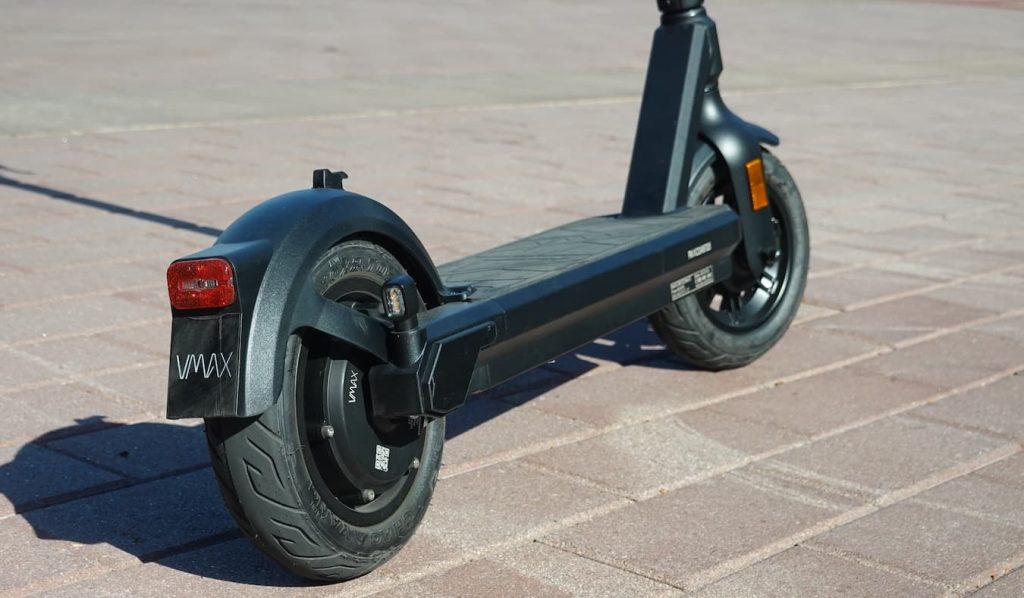
Fly E-Bike
This was my first chance to see the expanded lineup from Fly, which is basically the go-to electric bicycle dealer in New York City. They’ve got dozens of retail footprints in the city and are the main supplier to all of those delivery riders you’ll see doing the important yet thankless work of criss-crossing the city to bring food and deliveries to residents in mere minutes.
While Fly is known for its electric bicycles, the company has expanded into nicer-looking and higher-performance electric seated scooters and motorcycles.
I was shocked to see the impressive designs at the booth, especially since I had long associated Fly with all of those electric bikes with massive batteries meant for all-day delivery riders and not heavier duty motorcycles like these.
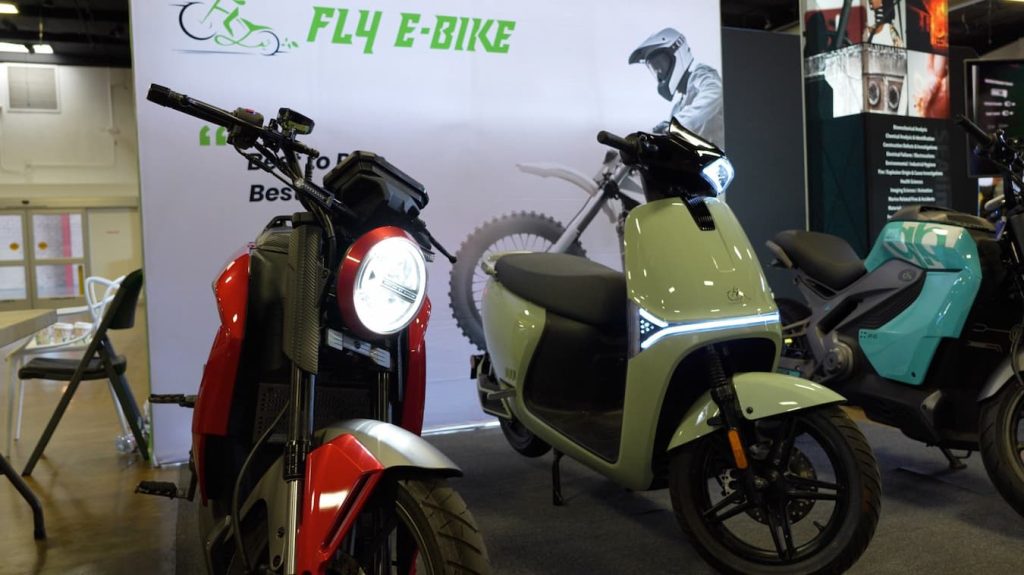
BikeOn electric bike conversion kit
The BikeOn conversion kit is one of the most highly engineered kits I’ve seen for converting a standard pedal bike into an e-bike.
It mounts in under 30 seconds to nearly any bicycle, attaching its bright red anodized gear ring to the largest sprocket on a bike’s rear cassette. It includes a built-in torque sensor that measures the force applied to the chain, allowing the small yet powerful motor to power the rear wheel directly.
The entire kit weighs just 3.8 lb (1.7 kg) without the battery, and that little motor is rated for either 250W or 750W, depending on the market. There’s even a compatible Android and iOS smartphone app that you can use as the kit’s dashboard.
The battery fits in a water bottle holder, and adds just 3.3 lb (1.5 kg) to the bike. It’s fairly small at 250 Wh, but they say it can add 20 miles of range to the bike.
This kit is not cheap, priced at US $1,246 without a battery or US $1,599 with a battery. You can buy very nice complete electric bicycles for that price, but that’s not really the point of this kit. Instead, this is designed to allow riders to convert a bicycle that they already own and love – especially nicer, high-end bicycles that you wouldn’t want to bolt a bunch of heavy gear onto.
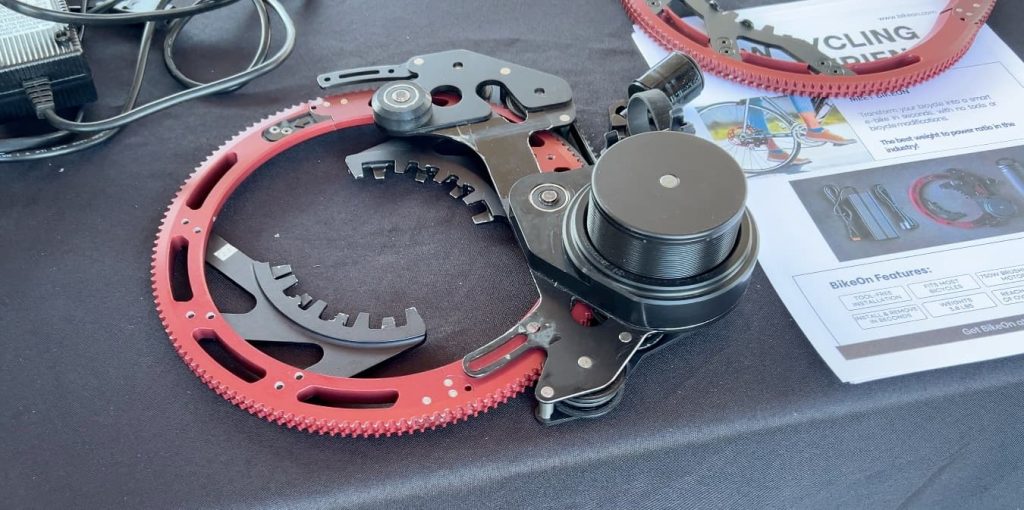
Oh Wow Cycles
Oh Wow Cycles has some of the biggest – and coolest – electric bicycles I’ve ever seen. This company’s electric trikes are simply out of this world. Sure, they’ve got more “normal” two-wheeled e-bikes too, but the rickshaws are what really catch your eye. And that’s exactly what happened at the show, with these big people movers instantly drawing me into the booth.
The new Conductor Plus is basically the minivan of the e-bike world, providing ample seating in the back for multiple children or even adults! And as a double-duty electric trike, the bench seat actually folds forward to convert into more of a pickup truck bed for cargo or pets.
Unlike some trikes, which require you to bust out your hex wrench set and swap accessories to convert from passengers to cargo-carrying setup, this e-trike can convert in two seconds without the need for any tools.
There are also an option for dual batteries, which is a good idea for anyone planning on longer rides or using this e-bike for more commercial-style delivery duty.
I was also fortunate to have the chance to meet the company’s founder, Ash Soliman, and get a tour of the new models with him at the company’s booth. It was refreshing to see how excited Ash is about these e-bikes, especially for their use in so many roles from family transport to cargo duties and more.
These are definitely some awesome models to check out if you want the kind of heavy-hauling capabilities that expand beyond those of a traditional e-bike or even cargo bike.
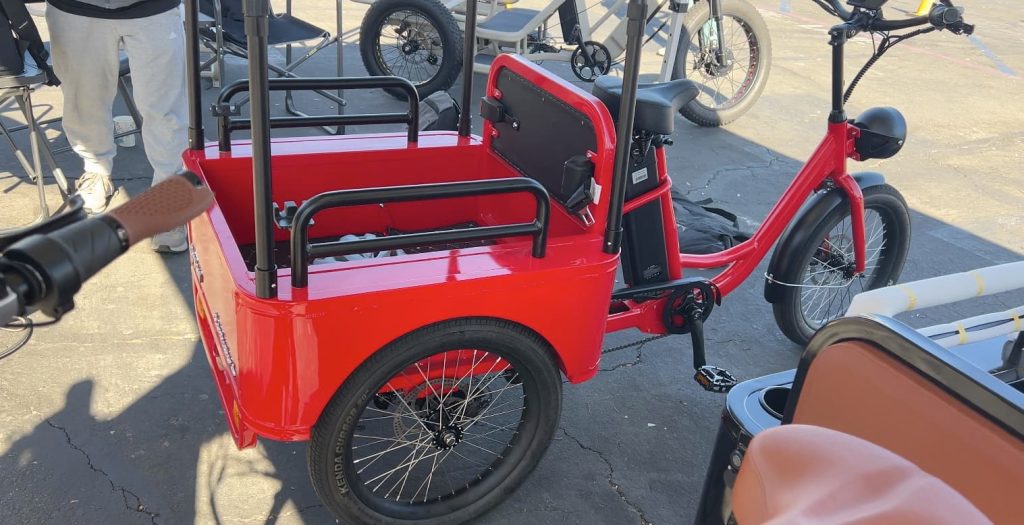
Tempo e-bike insurance
Getting your electric bike stolen is an awful feeling. I’ve been there. Multiple times. Not only does it feel like a personal violation, but you’re left with a serious financial loss since most e-bikes are well over $1,000.
Fortunately, there’s a new electric bike theft insurance program called Tempo that sounds like exactly what I need – and probably what you need, too.
The company’s founder, Michael Keating, explained to me how the system works. In a nutshell, you pay US $199 and you get three years of theft protection – basically $5.50 per month. That protection includes active theft recovery by working with bike registries and local law enforcement. As part of the membership, riders get a registered bike number stamped on multiple anti-theft stickers designed to alert thieves of the active recovery program, and the stickers also include a special UV pigment so they still leave a mark on the bike even if removed.
If a bike is stolen, Tempo does its best to get it back using all of its various tools and connections in the industry. If they can’t get your bike back, you get up to $2,500 from Tempo to replace the bike. If you’re riding any of the mostly sub-$2,500 electric bikes in the US (the vast majority of all e-bikes), that’s a pretty great deal. If you’re on a $10,000 S-Works e-bike, you may want to look for a different insurance program.
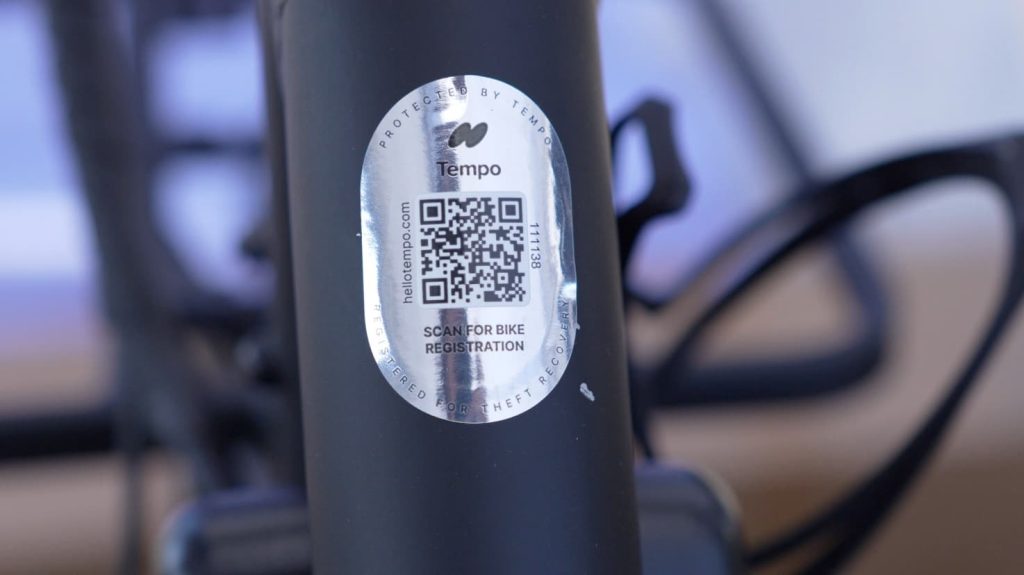
Hyryd hydrogen-powered e-bikes
I first had the chance to see Hyryd’s hydrogen-powered electric bikes at the Micromobility Europe 2024 show, and now the company most recently showed off their technology in the US at Micromobility America 2024.
Unlike nearly all other e-bikes, which store energy in a battery, the Hyryd e-bikes use a small hydrogen tank combined with a fuel cell to generate electricity that powers the rear-wheel motor.
The bikes themselves are designed for the European market and thus don’t have the same power we’re used to in the US, but the technology is neat to see in action.
I’m not sure this is the future of e-bikes, and in fact I’m fairly sure it isn’t. But if they can find some niche use such as in sharing or commercial fleets where a central electrolysis machine can refill hydrogen bottles in a depot, then perhaps there’s something to this.
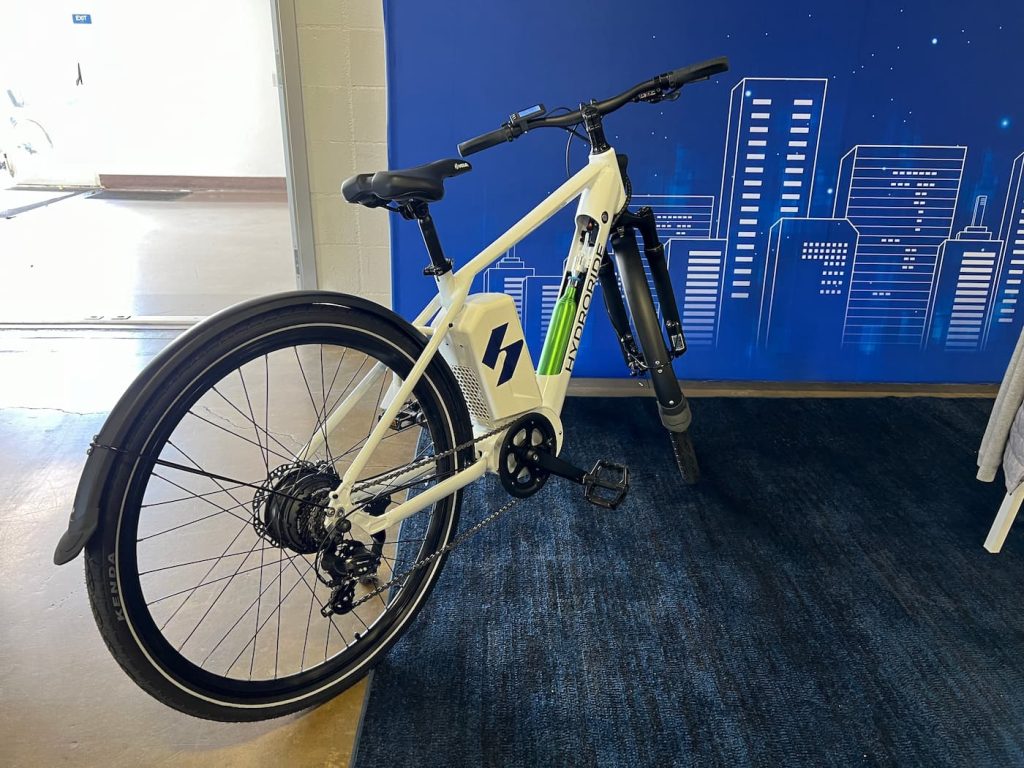
E-Cuffs scooter lock
This one caught me by surprise, but it was neat to see these new scooter handcuff-style locks from E-Cuffs.
They use a quick-release system, so they can stay mounted on the scooter’s stem for normal use and then pop off for quick locking to various objects.
Scooters can represent a tricky locking problem since they rarely have a good triangle like e-bikes to secure a lock onto the frame. But with the E-Cuffs, an e-scooter can be conveniently locked around its stem or downtube.
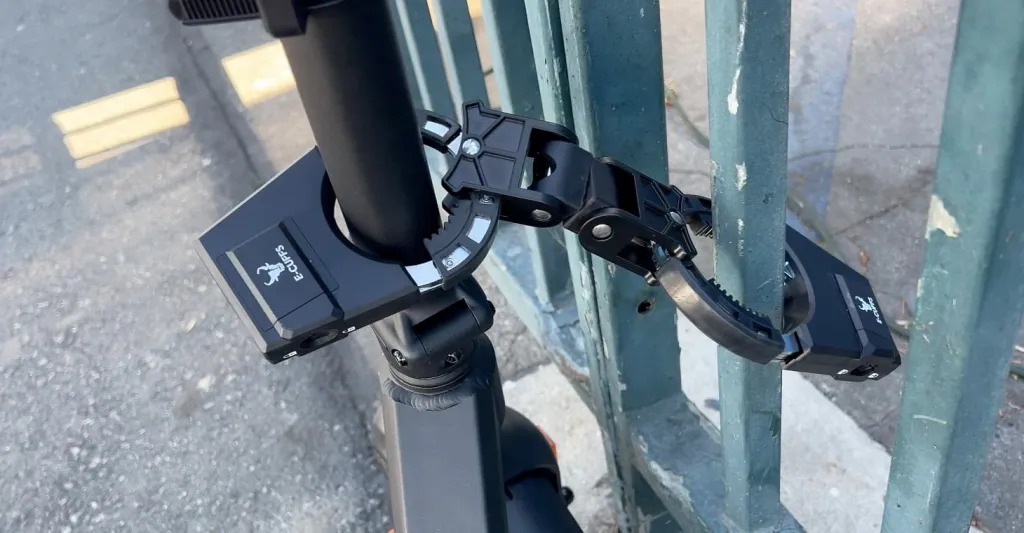
Joyride Revii
We’ve seen Joyride at several events in the past, showcasing the company’s connected platform that makes it easy for startups or established companies to operate fleets of smart-connected micromobility vehicles. Want to open your own Bird scooter startup? Joyride can get you up and running easily with your own fleet of digitally integrated scooters that all phone home.
Now the company is demonstrating off a new platform called Revii for larger micromobility vehicles (sometimes referred to as “minimobility”) including golf carts, Low-Speed Vehicles (LSVs) and other Neighborhood Electric Vehicles (NEVs).
The app works similarly to Joyride’s micromobility platform, but makes it easier for hotels, resorts, convention centers, or other operators of vehicle fleets like these to manage and control their vehicles.
As these important car-replacing vehicles become more common, and more locations begin offering fleets for rental, shared, or other commercial uses, Revii’s platform could become increasingly common in the space.

Ryvid electric motorcycles
Electric motorcycles were also a big part of the show, with Ryvid sharing test rides on its US-built Anthem and Outset electric motorcycles. Both feature Ryvid’s proprietary removable battery design, allowing motorcycle owners to park outside and roll their large battery into their garage or apartment to charge from a wall plug. You can even take it up into a tall apartment building as long as you’ve got an elevator!
The Anthem also has a number of other cool features, such as its actuator-controlled adjustable frame, which lets riders move the seat up and down by as much as four inches (100 mm), even while riding.
The Outset is built on a similar frame, though lacks the actuator. It’s built more like a dual-sport bike and will likely make off-road riders feel more at home than the obviously commuter-oriented Anthem. At under $6k, it’s also very attractively priced – though the Anthem’s $6,495 price is also quite enticing.
Both bikes are capable of highway speeds into the 70’s of MPH, and can achieve city ranges of up to 70 miles, though highway commuting will quickly drop that range.
I also had the chance to try the updated Anthem at the Outset, sneaking them out of the show grounds for some street riding. The Outset I tested even had Ryvid’s higher-power ASI controller, which offers a major power upgrade for riders who want even more performance.
These are incredibly well-designed electric motorcycles, though you have to remember that they’re designed for local riding first. With a 4 kWh battery, they just aren’t meant for touring or long-distance riding. But for anyone who commutes 20 miles to work and wants a fun, inexpensive, and efficient electric vehicle to turn that slog of a commute into a joyride, this is the way to go!
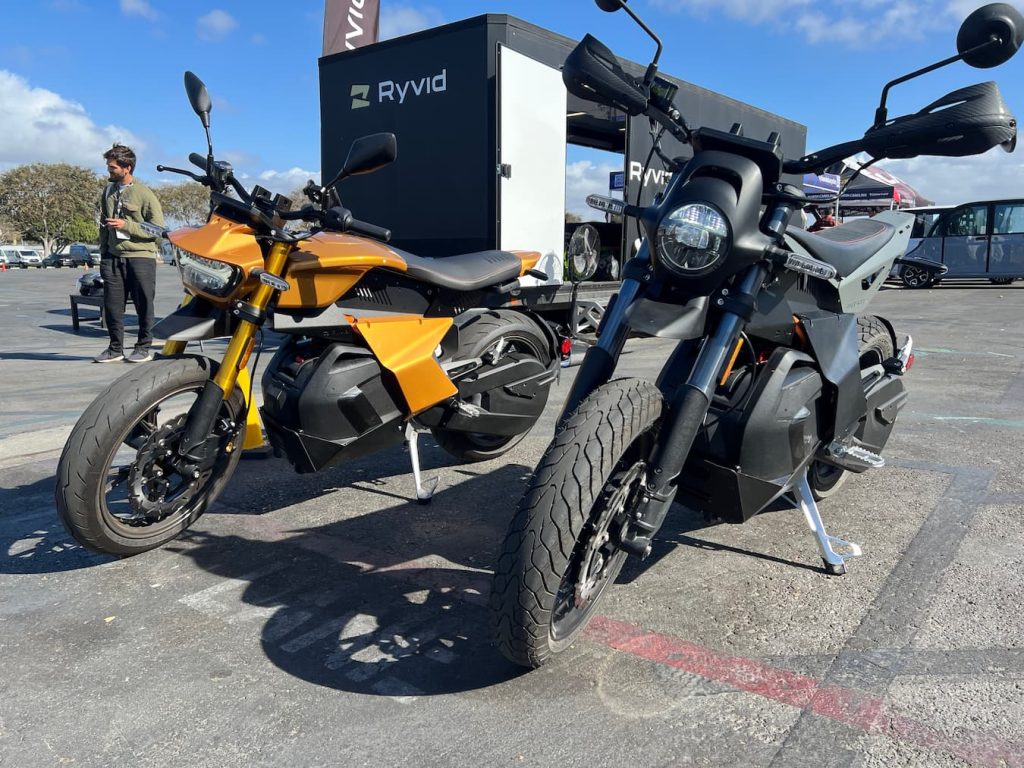
Land Moto
Land Moto also boasts US manufacturing for its commuter-level electric motorcycles, which carry their own unique design styling. This was my first chance to see Land Moto’s bikes in person and they were definitely head-turners.
Starting at $6,995, the Land Moto District comes in street and dirt versions, with both claiming a max speed of 70 mph (112 km).
They also tout a max range of 120 miles (193 km), though that’s from the largest battery option with 4.8 kWh of capacity. The base model has a 1.8 kWh battery that claims a more conservative 40 miles (64 km) of range at slower city speeds.
The ability to dial in the battery capacity (and its effect on pricing) allows riders to choose exactly what they need, which is a rare feature in this industry.
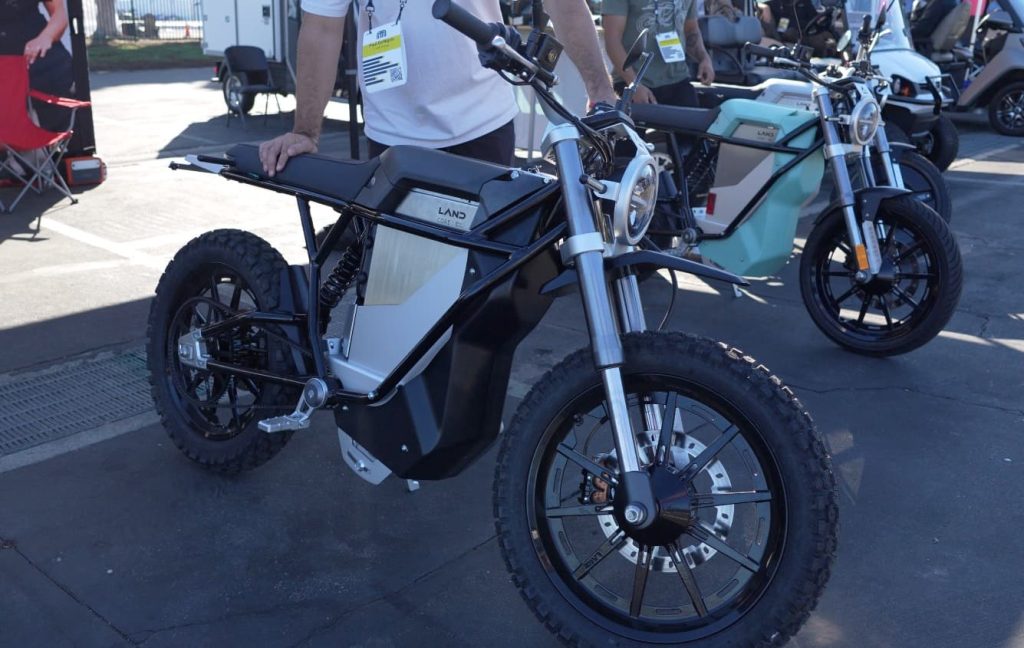
Shandoka electric motorcycle conversion kit for classic motorcycles
This one is absolutely fascinating. Check this out: Shandoka is an electric motorcycle conversion kit company that has developed a patented conversion system that fits a wide range of classic motorcycles. The system includes a battery and controller setup that mounts in the frame in place of the original combustion engine, and a rear hub motor that replaces the previous rear wheel.
It allows riders to breathe new life into older bikes, especially those that suffer from engine problems but otherwise still have structurally sound frames and components that could easily be put back onto the road with a new powertrain.
And because most of these bikes were originally produced in the 1980s, they are usually grandfathered into those older regulations making these types of conversions incredibly easy to perform.
These bikes in the pictures from the show are all naked showing off the engineering that went into the design, but they can also be buttoned back up or covered in a builder’s own custom body panels to create unique new designs.
The brainchild (and labor of love) of Ernest Eich, these conversion kits are built in the company’s North Carolina facility, showcasing yet another example of US manufacturing for electric motorcycles and their components.
I had the chance to chat with Ernest at the show, and this is a company that we’ll definitely want to take a deeper looker at soon.
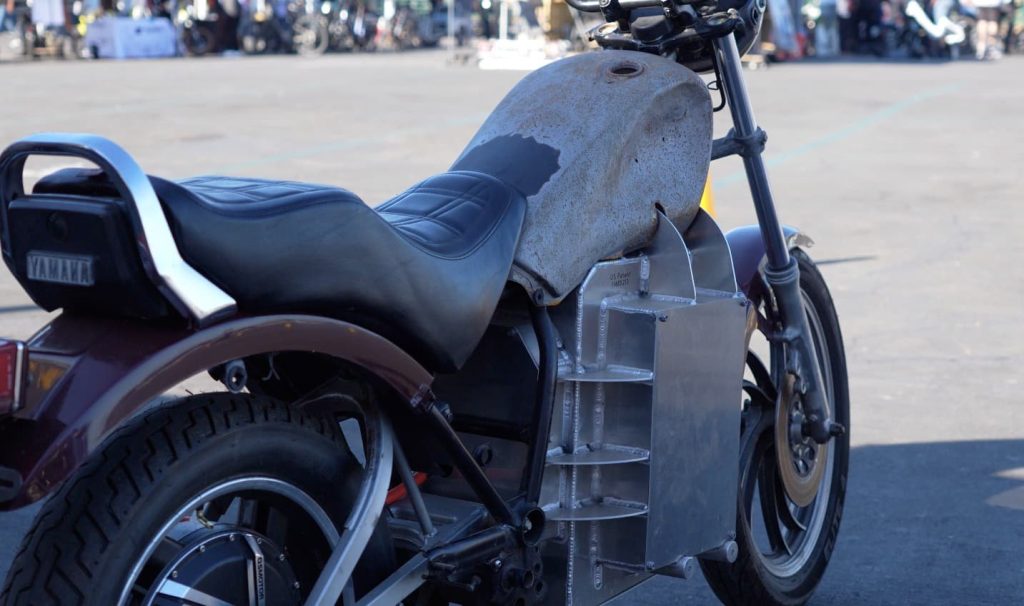
There’s always more to come
While this can’t cover everything at the show, it’s a collection of some of the most interesting and standout examples of micromobility in all of its diverse forms.
As the industry continues to grow and mature, bouncing back from a rollercoaster of highs and lows since the beginning of the pandemic years, we’re expecting to continue seeing more innovation and interesting designs like these.
Stay tuned for some deeper dives into several of these companies as we explore what makes their light electric vehicles and production processes unique.
